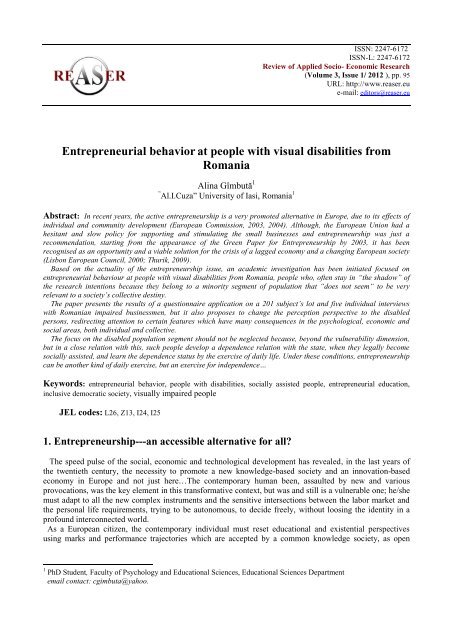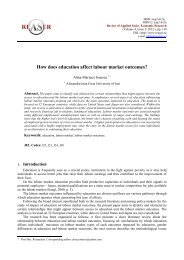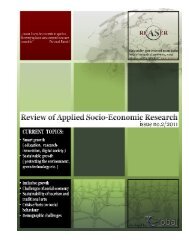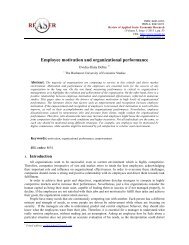Volume 3, ISSUE1/2012 - Review of Applied Socio-Economic ...
Volume 3, ISSUE1/2012 - Review of Applied Socio-Economic ...
Volume 3, ISSUE1/2012 - Review of Applied Socio-Economic ...
You also want an ePaper? Increase the reach of your titles
YUMPU automatically turns print PDFs into web optimized ePapers that Google loves.
ISSN: 2247-6172<br />
ISSN-L: 2247-6172<br />
<strong>Review</strong> <strong>of</strong> <strong>Applied</strong> <strong>Socio</strong>- <strong>Economic</strong> Research<br />
(<strong>Volume</strong> 3, Issue 1/ <strong>2012</strong> ), pp. 95<br />
URL: http://www.reaser.eu<br />
e-mail: editors@reaser.eu<br />
Entrepreneurial behavior at people with visual disabilities from<br />
Romania<br />
Alina Gîmbută 1<br />
“ Al.I.Cuza” University <strong>of</strong> Iasi, Romania 1<br />
Abstract: In recent years, the active entrepreneurship is a very promoted alternative in Europe, due to its effects <strong>of</strong><br />
individual and community development (European Commission, 2003, 2004). Although, the European Union had a<br />
hesitant and slow policy for supporting and stimulating the small businesses and entrepreneurship was just a<br />
recommendation, starting from the appearance <strong>of</strong> the Green Paper for Entrepreneurship by 2003, it has been<br />
recognised as an opportunity and a viable solution for the crisis <strong>of</strong> a lagged economy and a changing European society<br />
(Lisbon European Council, 2000; Thurik, 2009).<br />
Based on the actuality <strong>of</strong> the entrepreneurship issue, an academic investigation has been initiated focused on<br />
entrepreneurial behaviour at people with visual disabilities from Romania, people who, <strong>of</strong>ten stay in “the shadow” <strong>of</strong><br />
the research intentions because they belong to a minority segment <strong>of</strong> population that “does not seem“ to be very<br />
relevant to a society’s collective destiny.<br />
The paper presents the results <strong>of</strong> a questionnaire application on a 201 subject’s lot and five individual interviews<br />
with Romanian impaired businessmen, but it also proposes to change the perception perspective to the disabled<br />
persons, redirecting attention to certain features which have many consequences in the psychological, economic and<br />
social areas, both individual and collective.<br />
The focus on the disabled population segment should not be neglected because, beyond the vulnerability dimension,<br />
but in a close relation with this, such people develop a dependence relation with the state, when they legally become<br />
socially assisted, and learn the dependence status by the exercise <strong>of</strong> daily life. Under these conditions, entrepreneurship<br />
can be another kind <strong>of</strong> daily exercise, but an exercise for independence…<br />
Keywords: entrepreneurial behavior, people with disabilities, socially assisted people, entrepreneurial education,<br />
inclusive democratic society, visually impaired people<br />
JEL codes: L26, Z13, I24, I25<br />
1. Entrepreneurship---an accessible alternative for all?<br />
The speed pulse <strong>of</strong> the social, economic and technological development has revealed, in the last years <strong>of</strong><br />
the twentieth century, the necessity to promote a new knowledge-based society and an innovation-based<br />
economy in Europe and not just here…The contemporary human been, assaulted by new and various<br />
provocations, was the key element in this transformative context, but was and still is a vulnerable one; he/she<br />
must adapt to all the new complex instruments and the sensitive intersections between the labor market and<br />
the personal life requirements, trying to be autonomous, to decide freely, without loosing the identity in a<br />
pr<strong>of</strong>ound interconnected world.<br />
As a European citizen, the contemporary individual must reset educational and existential perspectives<br />
using marks and performance trajectories which are accepted by a common knowledge society, as open<br />
1 PhD Student, Faculty <strong>of</strong> Psychology and Educational Sciences, Educational Sciences Department<br />
email contact: cgimbuta@yahoo.








